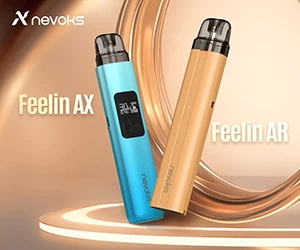A recent study from Johns Hopkins Bloomberg School of Public Health in Maryland concluded that there may be a link between e-cigarette usage and prediabetes. However, the evidence is far from clear, leaving even some researchers questioning this relationship.
The research conducted at the University of Public Health in Baltimore analyzed approximately 600,000 American adults from 2016 to 2018. The researchers focused on the link between adults who vaped and/or smoked and their likelihood to have prediabetes.
The results determined that 9% of current e-cigarette users, 5.9% of sole e-cigarette users, and 10.2% of dual users (those who vape and smoke cigarettes) were experiencing self-reported prediabetes diagnoses. The results were published in the American Journal of Preventive Medicine on March 3.
Why this study may not show the true relationship between vaping and prediabetes
E-cigarette use information in this study was collected by asking participants: Have you ever used an e-cigarette or other electronic “vaping” product, even just one time, in your entire life? The study defined sole e-cigarette users as current e-cigarette users who are never combustible-cigarette users, and dual users were defined as both current e-cigarette and combustible-cigarette users. Participants with prediabetes were identified by asking: Ever been told by a doctor or other health professional that you have prediabetes or borderline diabetes?
According to this methodology, those who self-reported using an e-cigarette even once were considered as e-cigarette users. If these participants also self-reported as having been told by a doctor or health professional that they have prediabetes or borderline diabetes, the researchers considered this as a link.
It is interesting to note that, according to the National Diabetes Statistics Report for 2020, among US adults aged 18 years or older, crude estimates for 2013–2016 were that:
- 34.5% of all US adults had prediabetes, based on their fasting glucose or A1C level.
- 10.5% of adults had prediabetes based on both elevated fasting plasma glucose and A1C levels-
- 15.3% of adults with prediabetes reported being told by a health professional that they had this condition.
The statistics stated above show that prediabetes is a condition that affects over one third of Americans. People can be diagnosed with prediabetes even if they do not vape or smoke. Just because participants self-reported as being e-cigarette users and as having a prediabetes diagnosis does not in any way prove that vaping was the direct cause of the prediabetes.
Another key issue with this research is the direct ties between John Hopkins and Michael Bloomberg. Bloomberg is a stern anti-vaping advocate and has backed programs against vaping and e-cigarettes for many years. The potential for bias in this instance is something to be considered when touting the results against e-cigarettes.
While the study has been cited by many news articles condemning vaping, the results of their research is still rife with uncertainty.
“The findings do not prove that vaping directly raises the odds of prediabetes,” stated Shyam Biswal. Biswal is a senior researcher at Johns Hopkins University School of Public Health. Uncertainty from even a senior researcher is a clear indication that the link is not as simple as these media sources have declared.
Another aspect of uncertainty possibly arises from the methodology administered. Questionnaires, self-reports and surveys all rely solely on a candidate’s honesty, which can be a tricky affair at the best of times.
Background
It is no secret that Bloomberg has been an anti-vaping advocate for the past few years. In 2019, Bloomberg submitted $160 million in funding for a Bloomberg Philanthropies program designed to reduce the “youth e-cigarette epidemic.” Furthermore, Bloomberg Philanthropies are easily found as partners to the World Health Organization’s Tobacco Free Initiative. Despite vaping’s clear benefit in aiding tobacco harm reduction, it is often clumped together with smoking in these initiatives.
The link between traditional smoking and diabetes is well-known and documented. The main mechanism in which smoking leads to prediabetes and type II diabetes is through the spike in blood sugar levels from a reaction caused by nicotine. This link between smoking and diabetes has now made its way to e-cigarettes and vaping, solely based on nicotine content.
With such a known relationship between the traditional smoking and diabetes, concern can be raised when pondering how there is still doubt regarding the relationship between vaping and diabetes. Even through a Johns Hopkins study there is still uncertainty. It becomes clear that the relationship may not be as clearly detrimental as many news articles have demonstrated over the past years.
In terms of diabetes, the link between traditional smoking and vaping is severed even greater when considering the nicotine content between the two. Traditional cigarettes typically boast a nicotine content of 10 milligrams per cigarette, with one to two milligrams being taken into the smoker’s body during the smoking process. On the other hand, many vape enthusiasts choose to vape at much lower nicotine contents than traditional cigarettes, some even preferring zero nicotine variations of their e-liquids.
While there is a wide range of options regarding nicotine percentage in e-liquids, a study conducted in 2019 showed that nicotine absorption is significantly less than combustible cigarettes when looking at e-liquids with comparable nicotine contents. Being subject to little to no nicotine when vaping when compared to smoking means the risk of prediabetes and type II diabetes drops massively.
Further illustrating this point, another study concluded that in order to achieve similar nicotine absorption to cigarette smoking, one would have to opt for e-liquids containing close to 50 milligrams per milliliter. This is universally a very high strength e-liquid, typically found only in nicotine salt eliquids.
Nic salt, as it is colloquially referred to, is somewhat of a departure from what is typically thought of when considering vaping as it is generally more used directly for smoking cessation through high nicotine uptake to combat withdrawal. Vapers that opt for nic salts are usually those who are specifically seeking out ways to intake high amounts of nicotine, which is only a small part of vaping for many.
Summary
This new study from Johns Hopkins Bloomberg School of Public Health has been the source of numerous citations from many news articles recently. While these articles are holding the study’s results as definitive evidence, even senior researchers that partook in the study still have uncertainty. Potentially due to Bloomberg’s transparent stance against vaping, these uncertainties have gone relatively ignored in order to bolster the notion that vaping has a similar risk profile to traditional smoking.
The belief that e-cigarettes and vapes have anywhere near the potential of traditional cigarettes to cause diabetes appears to be mostly unfounded. In terms of the risk for prediabetes as a result of nicotine, this is even further negated, particularly when considering users who opt for e-liquids with <50 milligram per milliliter nicotine. As other studies show, blood sugar is not spiked nearly as much as when smoking regular cigarettes.
The pragmatic approach to this issue is to view the study results with a healthy amount of skepticism due to the clear anti-vaping backing the research possesses. Further study must be conducted before a true correlation can be determined.










Add comment